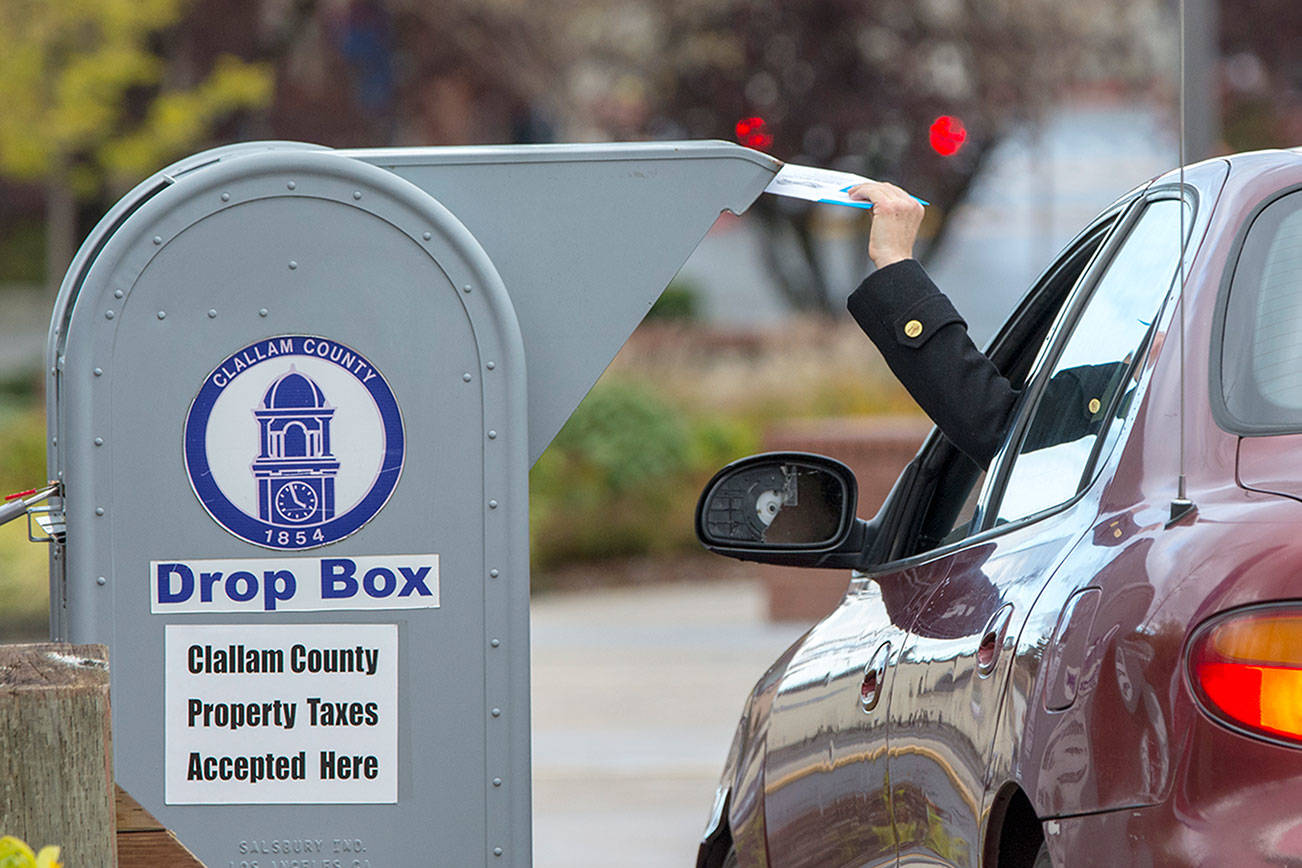By Rachel La Corte
The Associated Press
Washington is among half a dozen states in the Democratic presidential primary spotlight a week after Super Tuesday, an election taking place in the midst of the worst coronavirus outbreak in the nation.
As an all vote-by-mail state, Washington officials don’t have to worry about crowded polling places, and more than 1.4 million ballots have already been returned. That hasn’t stopped authorities from issuing cautions. The secretary of state’s office has taken to social media with the slogan of “Whether healthy or sick, please don’t lick!” to encourage voters to use a wet sponge or cloth to seal their envelopes as a precaution for election workers handling the ballots.
On the North Olympic Peninsula, ballots must be postmarked by today — no postage required — or returned to the county Auditor’s Office, which will be open from 8:30 a.m. to 8 p.m. today in the Clallam and Jefferson courthouses, or a ballot drop-box by 8 p.m. today.
Drop boxes in Clallam County are at:
• Carlsborg – 261461 U.S. Highway 101 near Sunny Farms.
• Clallam Bay – 16990 state Highway 112 in front of the Clallam Bay Library.
• Forks – 500 E. Division St., outside Forks City Hall.
• Neah Bay – 1450 Bayview Ave., in front of Washburn’s General Store.
• Clallam County Courthouse – 223 E. Fourth St., Port Angeles.
• Sekiu – 15 Sekiu Airport Road at the Clallam County Public Utility District office.
• Sequim – 651 W. Washington St., in the parking lot near JCPenney.
For more information, see www.tinyurl.com/PDN-ElectionInfo or call 360-417-2217.
Drop boxes in Jefferson County are at:
• Brinnon Community Center – 306144 U.S. Highway 101.
• Quilcene Community Center – 294952 U.S. Highway 101.
• Jefferson County Library – 620 Cedar Ave., Port Hadlock.
• Nordland Fire Station – 6633 Flagler Road, Nordland.
For more information, see www.tinyurl.com/PDN-JeffersonInfo or call 360-385-9117.
Peninsula Daily News subscribers will be able to access presidential primary results only online at peninsuladailynews.com tonight and Wednesday.
Results will not be published in the Wednesday print edition because of the state closure of the Hood Canal Bridge for five hours that night, which will prohibit a late deadline for the newspaper printed in Everett and delivered across the bridge.
Results and reactions to them will be published Thursday.
With 89 pledged delegates at stake, Washington has the second-highest number to be divvied up behind Michigan’s 125. With an earlier primary, and Democrats using the results for the first time instead of the caucuses, a broader group of voters in the state will now have a say in the nominating process.
“I think the goal that we wanted — as many voices as possible that can be heard in the primary — has been more than achieved,” said Tina Podlodowski, chairwoman of the state Democratic Party.
While the Washington ballot has 13 candidates — along with an uncommitted option — just three remain in the race after last week’s votes in 14 states and the territory of American Samoa. It’s essentially a two-person race between former Vice President Joe Biden and Vermont Sen. Bernie Sanders. President Donald Trump is the only Republican candidate.
The ultimate Democratic nominee must claim 1,991 delegates. Biden has at least 664 delegates so far, while Sanders has at least 573, according to the AP delegate count. Hawaii Rep. Tulsi Gabbard has two.
Washington had long had both a presidential primary and a caucus, and in 2016, Republicans used the primary — previously held in May — to allocate delegates while Democrats ignored the primary results and used the results of March precinct caucuses. Bernie Sanders handily won more than two-thirds of the delegates from the caucuses that year, which were attended by about 230,000 Democrats. More than 800,000 Democrats sent in ballots for the primary later that year — which Hillary Clinton won — even though their vote didn’t count in the nominating process.
The state Democratic Party’s central committee voted last year to start using a hybrid system that uses the state’s vote-by-mail system for a presidential primary to apportion delegates to candidates, and caucuses and conventions to select which delegates will represent the state at the national convention in Milwaukee in July. Also last year, Democratic Gov. Jay Inslee signed a measure moving the state’s presidential primary from May to March.
Republican Secretary of State Kim Wyman said voter interest is especially high this year with the earlier primary making the state more relevant in the national delegate chase.
“Our voters’ votes could potentially affect the winner of the Democratic primary,” she said.
Both parties have rules that only voters who identify with a party may participate in the primary to allocate delegates to the national nominating conventions. Washington state has no party registration, and in order to have their vote in the presidential primary counted, voters must sign a pledge on the envelope affirming to being either Republican or Democrat. They can only vote in the race that corresponds with their party.
Of the state’s 89 delegates, 58 will be allocated based on the outcome in congressional districts and the remainder are allocated based on statewide results.
An additional 18 delegates are “automatic” delegates. Also known as superdelegates, they are not pledged to any particular candidate but, but following changes made after the 2016 election, they cannot vote on the first nominating ballot at the national convention.
Will Casey, a spokesman for the state Democrats, said that under Democratic National Committee Rules, if any candidate hits the 15 percent threshold in voting, they are allotted delegates, even if no longer in the race. Those delegates will be pledged to that candidate on the first ballot, though they can ultimately be released by that candidate.
Because voters’ ballots only have be to postmarked by today or dropped at an election box by 8 p.m., final results could take days or weeks to calculate.
